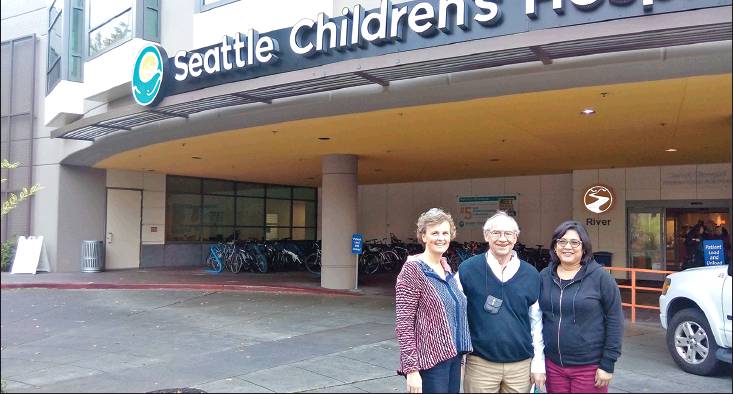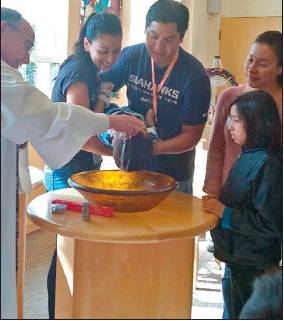Ministry team cares for families at children’s hospital
BY JULIE GUNTER
SEATTLE. “If I could, I’d live here,” Deacon Denny Duffell said with a faint smile as he waited, along with another member of St. Bridget Parish’s Camillus group — a volunteer-based ministry focused on serving Catholic families at nearby Seattle Children’s Hospital — for an elevator that would take them to yet another hospital floor. These clinical halls and sobering hospital rooms may not be anyone’s conception of an ideal daily routine, but for those who know Duffell, it’s an admission not far from the truth.
Duffell has been the Catholic chaplain at Seattle Children’s since 1983, so this hospital, which serves families from Washington, Alaska, Montana and Idaho, must feel like a second home. Duffell and his team of about 10 professionally trained pastoral care volunteers offer a consistent, compassionate listening presence as well as prayer, Communion and sacramental preparation to patients and families in medical crisis. These families, often uprooted from their communities and facing emotional, financial and other pressures, have long been central to the ministry of St. Bridget Parish, a church located just a short walk from the hospital.
Duffell’s responsibilities, which he has also balanced with diaconate duties at St. Bridget Parish and nearby Our Lady of the Lake Parish, are always in flux, reflective of patients’ health, families’ needs and hospital-related scheduling. During a recent visit, he and a fellow volunteer, Alicia Lanzner, donned gowns, masks and gloves to spend time with an almost 2-year-old boy, attended by his mother. The boy has lived at Seattle Children’s since undergoing a tracheotomy procedure shortly after birth, and was recently moved to an isolation room while recovering from a virus. Lanzner, who has ministered to the Spanish-speaking family since they first arrived at the hospital, helped with interpretation.
They spent the next hour stopping by the rooms of other patients whose families had requested Communion, prayer or simply a visit. Sometimes, extended family members gathered in waiting areas also recognized him as he passed, and waved him over to greet, embrace, or pray with him.
Duffell recognizes that his role at the hospital is to be present to these lived experiences, and try to make sure people never feel alone.
Lanzner agrees, describing the ministry as “a blessing that is also very humbling, to be able to give back and give thanks to God.”
“That’s how it is,” Duffell said, pausing over a folder of memories collected over the years: faded newspaper clippings; letters to and from parents; cherished funeral programs with the faces of children he once blessed on the covers. “Some things are horrible. Some things are marvelous. And kids die … and sometimes you know it’s going to break up a marriage. This is where people live life extremely intensely and they live more in those moments than at any other time in their lives. As chaplain, knowing this forces you to be as present as you can in the moment.”
“When I walk in a room, I know that God is there trying to communicate with that family, and I try to give presence and words to what God is trying to say. I feel lucky to be used as an instrument.”
Most often with a pager at his hip, Duffell will rush from home or from church whenever he’s called on, arriving at the hospital from either location within half an hour. On occasions when parents have refused to permit an urgently needed surgery to proceed until after their child has been baptized, Duffell has, one Camillus member shared with me, helped “save more than one life.” Only a few weeks ago, he dipped his hand into water from a hospital sink and, blessing the water, baptized a child as she was rushed toward the operating room by medical staff.
The Rev. Martha Dimmers, who leads the spiritual care team and staff support team at Seattle Children’s, explained that families “can sense [Duffell’s] authenticity, and he’s such a deep listener, he will stay present and available and people know this, in addition to the compassionate side he shows through thoughtful pastoral care and meaningful prayers, whether during a baptism or at the time of death or when saying goodbye. Sometimes Denny will stay for a long time, and even talk to the nurses and doctors. Occasionally, he has officiated at funerals, and he tries to make sure families go home to a support system, are connected.”
She described their shared work with families as a “meaningful journey” and one that brings them, as well as other chaplains and pastoral care volunteers, in close proximity to “the resilience and ability of parents to love their child and themselves in even the harshest of circumstances.”
From an office near the hospital’s in-patient entrance and an interfaith chapel, she added that she “personally feels strongly that it’s important that there be a strong partnership between the Roman Catholic church and hospitals since meaningful eucharistic support is a priority for many people.” Dimmers noted that in her prior chaplaincy work at hospitals around the country, she never encountered this same level of “educated, robust eucharistic ministry” as has been demonstrated through the professionalism of Camillus volunteers.
Jake Jacobs, a member of the Camillus group, describes this outreach as “a steady presence” based on foundational and ongoing education provided through Cabrini Ministry Training, an organization that teaches “people how to listen ... and how to be flexible and attentive based on the rhythm of family and medical situations.”
Founded as an extension of Blessed Mother Cabrini’s work, Cabrini Ministry Training is lay-led and is dedicated to forming Christians “in the Catholic Tradition for compassionate pastoral service in our community to bring Christ’s healing presence to God’s people,” according to its mission statement. Jacobs, who also serves as a board member, explained that Cabrini Ministry has been an invaluable resource in the preparation of lay volunteers for hospital outreach, and at Seattle Children’s in particular.
Addressing the spiritual needs of Catholic families at Seattle Children’s, as well as at other hospitals in the archdiocese, was a topic of discussion at a recent North Seattle Deanery meeting. Duffell and Dimmers, as well as a mother whose terminally ill child has been treated at Seattle Children’s, shared their experiences with priests and other local Catholic leaders.
Erica Cohen Moore, director for pastoral care for the Seattle archdiocese, recognizes the importance of hospital ministry as it pertains to evangelization.
“So many patients and families have been away from their faith for various reasons,” she said at the meeting. “It is often sickness and suffering that bring people back to their faith. It is so important that we do ministry well, especially at our hospitals as it presents a new door to our faith.”
The hospital provides funding for religious articles, such as Bibles in different languages, rosaries, breviaries and holy cards, but other articles and outreach related to Catholic sacramental life are highly dependent on the efforts of chaplains and trained volunteers, and in the case of reconciliation or the sacrament of the sick, can only be administered by priests. An increase in Spanish-speaking Catholic families has also increased the need for bilingual ministers.
Duffell, too, recognizes that training and mentoring others to continue and expand pastoral outreach in hospitals is crucial to the long-term sustainability of this ministry. When illness prevented him from working his usual shifts at the hospital earlier this year, a few local priests agreed to help with middle-of-the-night calls.
Now that Duffell is able to be back to the hospital full-time, he is seldom still — but, instead, delights in being with families at the hospital, journeying with them, praying for them, loving them. One of these families invited Duffell to the apartment they’ve rented near the hospital soon after their son, Tiago, was discharged until his next treatment. After conversing for a time, they gathered more closely together as Duffell blessed and prayed for Tiago, who was diagnosed with stage-four neuroblastoma last spring.
Despite the challenges they’ve faced since moving to Seattle, the family also spoke of experiencing times of great joy and peace, such as when Duffell baptized Tiago in the hospital chapel shortly after the family learned of his diagnosis and with more than 30 family members attending. During the ceremony, Tiago’s parents and two older siblings stood near, full of anticipation.
Tiago accepted the douses of water calmly, and then patiently waited while everyone traced the sign of the cross on his forehead.
[Julie Gunter is a longtime NCR contributor.]

